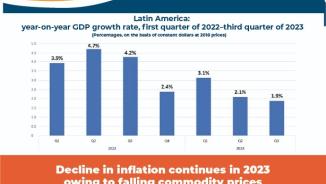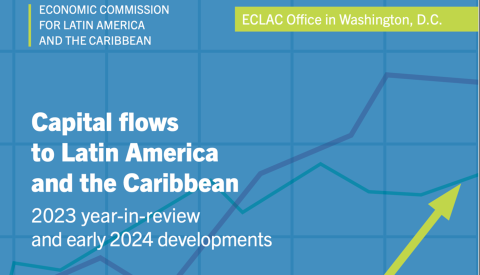infographic
(26 May 2011) The President of Poland's Central Bank, Marek Belka, gave today a lecture at the headquarters of the Economic Commission for Latin America and the Caribbean (ECLAC) in Santiago, Chile, during which he described the European response to the recent international crisis.
In his presentation entitled "The impact of the global financial crisis on the countries of the European Union", Mr Belka explained the various effects that international shocks have had on member countries of the European monetary union, and how these episodes revealed the weaknesses of economies within the single currency (euro). These included the lack of adequate banking supervision and the difficulties of coordinating different national fiscal policies.
The Polish representative was received by Alicia Bárcena, Executive Secretary of ECLAC, who welcomed him and praised his professional qualities: "ECLAC -and I personally- have been privileged to enjoy Marek's friendship for many years now, since his time as Executive Secretary of the Economic Commission for Europe, our sister organization for that region".
Ms Bárcena also highlighted the importance of learning about the European experience in reaction to the crisis because "Even if, for the first time, Latin America and the Caribbean as a whole was neither the source of a world crisis nor significantly impacted by it, we must pay very close attention to the evolution of the situation in the developed economies, particularly in Europe".
In his presentation, Marek Belka stressed the benefits that the euro has brought to members of the monetary union, as well as its shortcomings. He added that the main challenges involved in the European response to the recent crisis were: promoting competiveness for economies, encouraging employment, increasing the sustainability of public finances and strengthening financial stability.
He also referred to the possibility of introducing controls on the possible inflows of capital to emerging countries, and their usefulness as temporary measures under certain circumstances, as a means of avoiding damage to national economies.
He said that "The major challenge for the G-20, IMF and the United Nations is how to regulate flows of capital. Much has been done in terms of trade flows between world regions and nations, but less has been done in relation to capital. This remains an open question for the global community".
The lecture was attended by authorities, academics, representatives from international agencies and members of the diplomatic corps accredited in Chile, headed by Ryszard Piasecki, Polish Ambassador.
Marek Belka was appointed President of the National Bank of Poland (central bank) on 10 June 2010. He was previously Prime Minister of Poland (2004-2005), Executive Secretary of the United Nations Economic Commission for Europe (UNECE, 2005-2008) and Director of the European Department of the International Monetary Fund (IMF).
See also:
- Address by Alicia Bárcena, Executive Secretary of ECLAC (in English).
- Presentation by Marek Belka, President of the Central Bank of Poland (in English).
Any queries should be addressed to the ECLAC Public Information and Web Services Section. E-mail: dpisantiago@cepal.org; Tel.: (56 2) 210 2040.
Follow us on: Twitter , Facebook , Flickr and YouTube .


